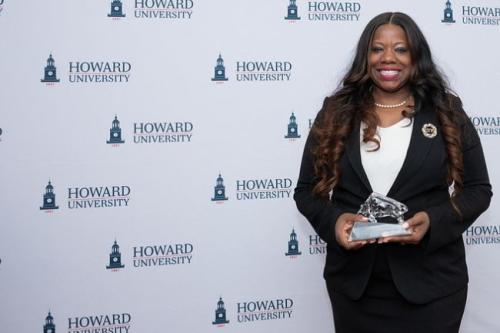When she first switched her major from chemistry to mathematics in her junior year, Cheyene Henry didn’t expect to find herself researching evolutionary game theory. But through a mix of curiosity, mentorship, and a willingness to leap into the unknown, she’s now part of a cutting-edge project that applies mathematical theory to real-world engineering.
Under the guidance of Dr. Bourama Toni, mathematics department chair, Cheyene Henry is exploring game theory, an area of mathematics that models decision-making between rational players. While game theory is often associated with economics and social sciences, her work takes it into a more unexpected arena: naval defense.
“At first, I thought game theory meant playing games,” she laughed. “But it’s really about understanding decision-making, figuring out how different agents choose between strategies and what outcomes result from those choices.”
Her research, conducted in partnership with the U.S. Navy, focuses on developing autonomous underwater sensors that can operate without centralized control. The challenge? Teaching these sensors how to “decide” when to move left, right, or stay still in a way that’s stable and reliable, essentially making strategic decisions in uncertain environments.
“We’re modeling how these sensors can behave using game theory,” she explained. “So instead of a person controlling them, they respond to their environment and each other. The idea is to find a mathematical framework that engineers can actually use to make these systems smarter and safer.”
To explain the core concept of game theory, she points to a classic example: the prisoner’s dilemma. In this scenario, two individuals must choose whether to cooperate or betray each other without knowing the other's choice. The mathematical model reveals how rational agents might make decisions that aren’t always ideal for both parties but are still the most logical for the situation.
“It really mirrors life,” she said. “It’s about figuring out how to act when you don’t know what the other person will do. And once you do this over and over again, you start to see patterns — that’s where evolutionary game theory comes in.”
Unlike static games, which analyze a single decision-making moment, evolutionary game theory studies how strategies shift over time. It draws from biology, economics, and differential equations to model dynamic systems like the sensors in her project. If one sensor seems to be doing better than another, others may replicate that behavior. This evolving landscape of decisions requires robust mathematical modeling to remain stable in real time.
Her work reflects not only the power of applied mathematics but also her openness to discovery. What began as a spontaneous conversation with her department chair has grown into a research endeavor with national defense implications.
But her research doesn’t stop at national defense. In a personal side project, Cheyne used game theory to explore a very different kind of decision-making, this time involving small business owners and consumers in the context of shifting corporate values.

As large corporations like Target roll back diversity, equity, and inclusion initiatives, Cheyene asked: What should small businesses do in response? Using a game-theoretical model, she examined the dynamics between morally driven consumers and the smaller vendors who rely on their business.
“I wanted to model what happens when consumers decide to stop shopping at big corporations because they care about values,” she said. “Should small businesses follow their lead, or stick with the convenience and money of partnering with those corporations?”
Her findings were striking. In a society where morals are prioritized over money, small businesses benefit most by aligning themselves with consumers even if it means giving up short-term profit or convenience. But even when financial motivations dominate, the model still didn’t clearly favor siding with large corporations, revealing a more mixed equilibrium.
“It surprised me,” she reflected. “Even when you flip the values to money over morals it’s still not cut-and-dry. The best strategy isn’t always to stay with the big corporations. There’s still a strong case for following consumer behavior.”
The significance of her personal project runs deeper than the results; it’s about the kinds of questions she’s asking.
“We don’t see a lot of interdisciplinary work between ethics and math,” she said. “That’s something I care about, especially because I want to be a data scientist. I wanted to show how math can be used to answer real questions about society and values.”
That’s what drew her to game theory in the first place: its unique ability to cross disciplinary boundaries while still grounded in mathematical rigor.

“Game theory is so cool because it can bring together biology, chemistry, sociology. It’s a math-based tool that lets you model systems across disciplines,” she said. “And when you prove something with math, it’s not just an idea. You can show there’s an equilibrium, a place where mutual benefit exists. That’s powerful.”
In the end, her work underscores a simple but often overlooked truth: Math isn’t just numbers; it’s a way of seeing the world.
“It brings light to the importance of mathematics in places where people don’t usually expect it,” she said. “It builds a beautiful connection between disciplines, between ideas. And that’s why it matters.”





